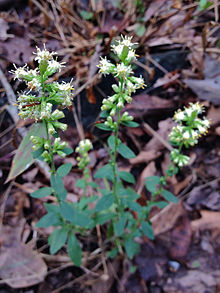Solidago bicolor, with several common names including white goldenrod[1][3] and silverrod,[1] is a plant species native to much of eastern North America.[4][1] It is found in Canada (from Manitoba to Nova Scotia) and in the United States (every state completely east of the Mississippi except Florida).[5] It prefers sandy and rocky soils, and can frequently be found along roadsides.
| Solidago bicolor | |
|---|---|

| |
| Scientific classification | |
| Kingdom: | Plantae |
| Clade: | Tracheophytes |
| Clade: | Angiosperms |
| Clade: | Eudicots |
| Clade: | Asterids |
| Order: | Asterales |
| Family: | Asteraceae |
| Genus: | Solidago |
| Species: | S. bicolor
|
| Binomial name | |
| Solidago bicolor L.
| |
| Synonyms[1][2] | |
|
Synonymy
| |

Solidago bicolor is distinctive in the genus. Stems are thin and wiry. Flowers are white rather than yellow, the heads mostly clustered in the axils of the leaves rather than displayed in a large terminal raceme.[1]
Galls
editThis species is host to the following insect-induced gall:
- Rhopalomyia guttata Dorchin
References
edit- ^ a b c d e Flora of North America, Solidago bicolor 1767, White goldenrod , silverrod , verge d’or bicolore
- ^ The Plant List, Solidago bicolor
- ^ NRCS. "Solidago bicolor". PLANTS Database. United States Department of Agriculture (USDA). Retrieved 18 November 2015.
- ^ Linnaeus, C. Systema Naturae, ed. 12 2: 556. 1767.
- ^ Biota of North America Program 2014 county distribution map